_Dr. Maurice Bucaille
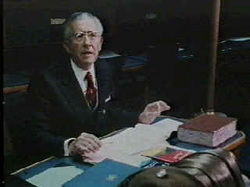
_Born in 1920, former chief of the Surgical Clinic, University of Paris, has for a long time deeply interested in the correspondences between the teachings of the Holy Scriptures and modern secular knowledge.
He is the author of a best-seller, "The Bible, The Qur'an and Science" (1976). His classical studies of the scriptural languages, including Arabic, in association with his knowledge of hieroglyphics, have allowed him to hold a multidisciplinary inquiry, in which his personal contribution as a medical doctor has produced conclusive arguments. His work, "Mummies of the Pharaohs - Modern Medical Investigations" (St. Martins Press, 1990), won a History Prize from the Académie Française and another prize from the French National Academy of Medicine.
His other works include: "What is the Origin of Man" (Seghers, 1988), "Moses and Pharaoh, the Hebrews in Egypt", (NTT Mediascope Inc, 1994); and "Réflexions sur le Coran" (Mohamed Talbi & Maurice Bucaille, Seghers, 1989)
After a study which lasted ten years, Dr. Maurice Bucaille addressed the French Academy of Medicine in 1976 concerning the existence in the Qur'an of certain statements concerning physiology and reproduction. His reason for doing that was that :
"...our knowledge of these disciplines is such, that it is impossible to explain how a text produced at the time of the Qur'an could have contained ideas that have only been discovered in modern times."
"The above observation makes the hypothesis advanced by those who see Muhammad as the author of the Qur'an untenable. How could a man, from being illiterate, become the most important author, in terms of literary merits, in the whole of Arabic literature?
How could he then pronounce truths of a scientific nature that no other human-being could possibly have developed at that time, and all this without once making the slightest error in his pronouncement on the subject?"
_
He is the author of a best-seller, "The Bible, The Qur'an and Science" (1976). His classical studies of the scriptural languages, including Arabic, in association with his knowledge of hieroglyphics, have allowed him to hold a multidisciplinary inquiry, in which his personal contribution as a medical doctor has produced conclusive arguments. His work, "Mummies of the Pharaohs - Modern Medical Investigations" (St. Martins Press, 1990), won a History Prize from the Académie Française and another prize from the French National Academy of Medicine.
His other works include: "What is the Origin of Man" (Seghers, 1988), "Moses and Pharaoh, the Hebrews in Egypt", (NTT Mediascope Inc, 1994); and "Réflexions sur le Coran" (Mohamed Talbi & Maurice Bucaille, Seghers, 1989)
After a study which lasted ten years, Dr. Maurice Bucaille addressed the French Academy of Medicine in 1976 concerning the existence in the Qur'an of certain statements concerning physiology and reproduction. His reason for doing that was that :
"...our knowledge of these disciplines is such, that it is impossible to explain how a text produced at the time of the Qur'an could have contained ideas that have only been discovered in modern times."
"The above observation makes the hypothesis advanced by those who see Muhammad as the author of the Qur'an untenable. How could a man, from being illiterate, become the most important author, in terms of literary merits, in the whole of Arabic literature?
How could he then pronounce truths of a scientific nature that no other human-being could possibly have developed at that time, and all this without once making the slightest error in his pronouncement on the subject?"
_
Keith L. Moore
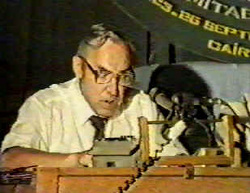
_Professor
Emeritus, Department of Anatomy and Cell Biology, University of Toronto.
Distinguished embryologist and the author of several medical textbooks,
including Clinically Oriented Anatomy (3rd Edition) and The
Developing Human (5th Edition, with T.V.N. Persaud).
Dr. Moore was a former President of the Canadian Association of Anatomists, and of the American Association of Clinical Anatomists. He was honoured by the Canadian Association of Anatomists with the prestigious J.C.B. Grant Award and in 1994 he received the Honoured Member Award of the American Association of Clinical Anatomists "for outstanding contributions to the field of clinical anatomy."
"For the past three years, I have worked with the Embryology Committee of King cAbdulaziz University in Jeddah, Saudi Arabia, helping them to interpret the many statements in the Qur'an and Sunnah referring to human reproduction and prenatal development. At first I was astonished by the accuracy of the statements that were recorded in the 7th century AD, before the science of embryology was established. Although I was aware of the glorious history of Muslim scientists in the 10th century AD, and some of their contributions to Medicine, I knew nothing about the religious facts and beliefs contained in the Qur'an and Sunnah."[2]
At a conference in Cairo he presented a research paper and stated:
"It has been a great pleasure for me to help clarify statements in the Qur'an about human development. It is clear to me that these statements must have come to Muhammad from God, or Allah, because most of this knowledge was not discovered until many centuries later. This proves to me that Muhammad must have been a messenger of God, or Allah." [1]
Professor Moore also stated that:
"...Because the staging of human embryos is complex, owing to the continuous process of change during development, it is proposed that a new system of classification could be developed using the terms mentioned in the Qur'an and Sunnah. The proposed system is simple, comprehensive, and conforms with present embryological knowledge.
"The intensive studies of the Qur'an and Hadith in the last four years have revealed a system of classifying human embryos that is amazing since it was recorded in the seventh century A.D... the descriptions in the Qur'an cannot be based on scientific knowledge in the seventh century..."[1]
Dr. Moore was a former President of the Canadian Association of Anatomists, and of the American Association of Clinical Anatomists. He was honoured by the Canadian Association of Anatomists with the prestigious J.C.B. Grant Award and in 1994 he received the Honoured Member Award of the American Association of Clinical Anatomists "for outstanding contributions to the field of clinical anatomy."
"For the past three years, I have worked with the Embryology Committee of King cAbdulaziz University in Jeddah, Saudi Arabia, helping them to interpret the many statements in the Qur'an and Sunnah referring to human reproduction and prenatal development. At first I was astonished by the accuracy of the statements that were recorded in the 7th century AD, before the science of embryology was established. Although I was aware of the glorious history of Muslim scientists in the 10th century AD, and some of their contributions to Medicine, I knew nothing about the religious facts and beliefs contained in the Qur'an and Sunnah."[2]
At a conference in Cairo he presented a research paper and stated:
"It has been a great pleasure for me to help clarify statements in the Qur'an about human development. It is clear to me that these statements must have come to Muhammad from God, or Allah, because most of this knowledge was not discovered until many centuries later. This proves to me that Muhammad must have been a messenger of God, or Allah." [1]
Professor Moore also stated that:
"...Because the staging of human embryos is complex, owing to the continuous process of change during development, it is proposed that a new system of classification could be developed using the terms mentioned in the Qur'an and Sunnah. The proposed system is simple, comprehensive, and conforms with present embryological knowledge.
"The intensive studies of the Qur'an and Hadith in the last four years have revealed a system of classifying human embryos that is amazing since it was recorded in the seventh century A.D... the descriptions in the Qur'an cannot be based on scientific knowledge in the seventh century..."[1]
_E. Marshall Johnson
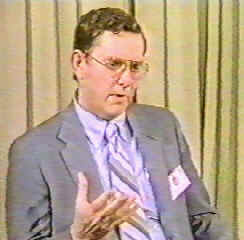
_Professor
and Chairman of the Department of Anatomy and Developmental Biology, and
Director of the Daniel Baugh Institute, Thomas Jefferson University,
Philadelphia, Pennsylvania, USA.
Author of over 200 publications. Former President of the Teratology Society among other accomplishments. Professor Johnson began to take an interest in the scientific signs in the Qur'an at the 7th Saudi Medical Conference (1982), when a special committee was formed to investigate scientific signs in the Qur'an and Hadith. At first, Professor Johnson refused to accept the existence of such verses in the Qur'an and Hadith. But after a dicussuion with Sheikh Zindani he took an interest and concentrated his research on the internal as well as external development of the fetus.
"...in summary, the Qur'an describes not only the development of external form, but emphasises also the internal stages, the stages inside the embryo, of its creation and development, emphasising major events recognised by contemporary science."
"As a scientist, I can only deal with things which I can specifically see. I can understand embryology and developmental biology. I can understand the words that are translated to me from the Qur'an. As I gave the example before, if I were to transpose myself into that era, knowing what I do today and describing things, I could not describe the things that were described...
I see no evidence to refute the concept that this individual Muhammad had to be developing this information from some place... so I see nothing here in conflict with the concept that divine intervention was involved in what he was able to write..."
Author of over 200 publications. Former President of the Teratology Society among other accomplishments. Professor Johnson began to take an interest in the scientific signs in the Qur'an at the 7th Saudi Medical Conference (1982), when a special committee was formed to investigate scientific signs in the Qur'an and Hadith. At first, Professor Johnson refused to accept the existence of such verses in the Qur'an and Hadith. But after a dicussuion with Sheikh Zindani he took an interest and concentrated his research on the internal as well as external development of the fetus.
"...in summary, the Qur'an describes not only the development of external form, but emphasises also the internal stages, the stages inside the embryo, of its creation and development, emphasising major events recognised by contemporary science."
"As a scientist, I can only deal with things which I can specifically see. I can understand embryology and developmental biology. I can understand the words that are translated to me from the Qur'an. As I gave the example before, if I were to transpose myself into that era, knowing what I do today and describing things, I could not describe the things that were described...
I see no evidence to refute the concept that this individual Muhammad had to be developing this information from some place... so I see nothing here in conflict with the concept that divine intervention was involved in what he was able to write..."
_T.V.N. Persaud
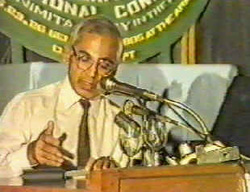
_Professor of Anatomy, and Professor of
Paediatrics and Child Health, University of Manitoba, Winnipeg, Manitoba,
Canada.
Author and editor of over 20 books, and has published over 181 scientific papers. Co-author of The Developing Human (5th Edition, with Keith L. Moore). He received the J.C.B. Grant Award in 1991. Professor Peraud presented several research papers.
"It seems to me that Muhammad was a very ordinary man, he couldn't read, didn't know how to write, in fact he was an illiterate...
We're talking about 1400 years ago, you have some illiterate person making profound statements that are amazingly accurate, of a scientific nature...
I personally can't see how this could be mere chance, there are too many accuracies and like Dr. Moore, I have no difficulty in my mind reconciling that this is a divine inspiration or revelation which lead him to these statements."_
Author and editor of over 20 books, and has published over 181 scientific papers. Co-author of The Developing Human (5th Edition, with Keith L. Moore). He received the J.C.B. Grant Award in 1991. Professor Peraud presented several research papers.
"It seems to me that Muhammad was a very ordinary man, he couldn't read, didn't know how to write, in fact he was an illiterate...
We're talking about 1400 years ago, you have some illiterate person making profound statements that are amazingly accurate, of a scientific nature...
I personally can't see how this could be mere chance, there are too many accuracies and like Dr. Moore, I have no difficulty in my mind reconciling that this is a divine inspiration or revelation which lead him to these statements."_
_Joe Leigh Simpson
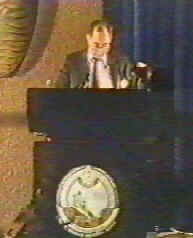
_Professor
and Chairman of the Department of Obstetrics and Gynaecology, Baylor
College of Medicine, Houston, Texas, USA.
He is the President of the American Fertility Society. He has received many awards, including the Association of Professors of Obstetrics and Gynaecology Public Recognition Award in 1992. Like many others, Professor Simpson was taken by surprise when he discovered that the Qur'an and Hadith contain verses related to his specialised field of study. When he met with Sheikh Abdul-Majeed A.Zindani, he insisted on verifying the text presented to him from the Qur'an and Hadith.
"... these Hadiths (sayings of Muhammad) could not have been obtained on the basis of the scientific knowledge that was available at the time of the 'writer'... It follows that not only is there no conflict between genetics and religion (Islam) but in fact religion (Islam) may guide science by adding revelation to some of the traditional scientific approaches... There exist statements in the Qur'an shown centuries later to be valid which support knowledge in the Qur'an having been derived from God."
He is the President of the American Fertility Society. He has received many awards, including the Association of Professors of Obstetrics and Gynaecology Public Recognition Award in 1992. Like many others, Professor Simpson was taken by surprise when he discovered that the Qur'an and Hadith contain verses related to his specialised field of study. When he met with Sheikh Abdul-Majeed A.Zindani, he insisted on verifying the text presented to him from the Qur'an and Hadith.
"... these Hadiths (sayings of Muhammad) could not have been obtained on the basis of the scientific knowledge that was available at the time of the 'writer'... It follows that not only is there no conflict between genetics and religion (Islam) but in fact religion (Islam) may guide science by adding revelation to some of the traditional scientific approaches... There exist statements in the Qur'an shown centuries later to be valid which support knowledge in the Qur'an having been derived from God."
_Gerald C. Goeringer
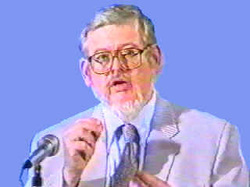
_Professor
and Co-ordinator of Medical Embryology in the Department of Cell Biology,
School of Medicine, Georgetown University, Washington DC, USA.
"...In a relatively few ayahs (Qur'anic verses) is contained a rather comprehensive description of human development from the time of commingling of the gametes through organogenesis. No such distinct and complete record of human development such as classification, terminology, and description existed previously. In most, if not all instances, this description antedates by many centuries the recording of the various stages of human embryonic and fetal development recorded in the traditional scientific literature."
"...In a relatively few ayahs (Qur'anic verses) is contained a rather comprehensive description of human development from the time of commingling of the gametes through organogenesis. No such distinct and complete record of human development such as classification, terminology, and description existed previously. In most, if not all instances, this description antedates by many centuries the recording of the various stages of human embryonic and fetal development recorded in the traditional scientific literature."
_William Hay
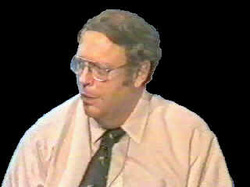
_Professor
of Oceanogprahy, University of Colorado, Boulder, Colorado, USA.
Professor Hay is one of the best known marine scientist in the USA. Sheikh cAbdul-Majeed A. Zindani met with him and asked him many questions about the marine surface, the divider between upper and lower sea, and about the ocean floor and marine geology.
"I find it very interesting that this sort of information is in the ancient scriptures of the Holy Qur'an, and I have no way of knowing where they would have come from. But I think it is extremely interesting that they are there and this work is going on to discover it, the meaning of some of the passages."
And when he was asked about the source of the Qur'an, he replied, "Well, I would think it must be the divine being."
Professor Hay is one of the best known marine scientist in the USA. Sheikh cAbdul-Majeed A. Zindani met with him and asked him many questions about the marine surface, the divider between upper and lower sea, and about the ocean floor and marine geology.
"I find it very interesting that this sort of information is in the ancient scriptures of the Holy Qur'an, and I have no way of knowing where they would have come from. But I think it is extremely interesting that they are there and this work is going on to discover it, the meaning of some of the passages."
And when he was asked about the source of the Qur'an, he replied, "Well, I would think it must be the divine being."
HTML Comment Box is loading comments...